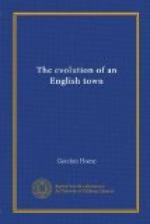I. The beauty of the scenery is not well known. This book should do something to vindicate its character. There is no need on this point to go back to the time of George III.’s conversation at the levee with Mrs Pickering’s grandfather. “I suppose you are going back to Yorkshire, Mr Stanhope? A very ugly country, Yorkshire.” This was too much for my grandfather—(the story is told in her own words)—“We always consider Yorkshire a very picturesque country.” “What, what, what,” said the King, “a coalpit a picturesque object! what, what, what, Yorkshire coalpits picturesque! Yorkshire a picturesque country!"[1] Only within the last few months one of us had a letter refusing to consider a vacant post: the reason given being that this was a colliery district. There is no pit to be found for miles. Many can, and do, walk, cycle, or motor through the Vale. Others, who are unable to come and see for themselves, will, with the help of Mr Home, be in a better position to appreciate at its true worth the charm of the haughs and the changing views of the distant Wolds, and of the russet brown or purple expanse of the upland moors.
[Footnote 1: “Memoirs of Anna M.W. Pickering.”]
II. The stranger on a visit, no less the historian or antiquary, has till now often been puzzled for a clue, and ignorant where to turn for authentic data, would he attempt to weave for himself a connected idea of the incidents of the past and their bearing on the present. There has been no lack of material buried in ancient records, or preserved in the common oral traditions of the folk: but hitherto no coherent account that has been published. Speaking for ourselves, we are glad the task of dealing with the “raffled hank” of timeworn customs and obscure traditions as well as the more easily ascertained facts of history is falling to the author’s practised pen. For the future, at any rate, there should be less difficulty in understanding the manner of life and method of rule with which past and present generations belonging to the Town of Pickering have been content to dwell.
III. “Foreigners"[1] are sometimes at a loss to understand the peculiar spirit of those who in York, for instance, are known as “Moor-enders.” This spirit shows itself in different ways; but perhaps in nothing so much as the intense attachment of the townsmen to their birthplace. This local patriotism is no whit behind that to be found in Spain—“seldom indeed a Spaniard says he is a Spaniard, but speaks of himself as being from Seville, Cadiz, or some forgotten town in La Mancha, of which he speaks with pride, referring to it as ‘mi tierra.’"[2] Our readers will learn there is some reason for this attachment; and may, like some of us, who tho’ born elsewhere claim adoption as citizens, fall under the witchery of its spell.
[Footnote 1: C.R.L. Fletcher in his “History of England” tells us that townsmen of the thirteenth century were wont to brand their brethren in all the neighbouring towns as “foreigners.” Those we call foreigners, they called aliens. The expression itself was made use of not long ago at a meeting of the Urban Council.]




